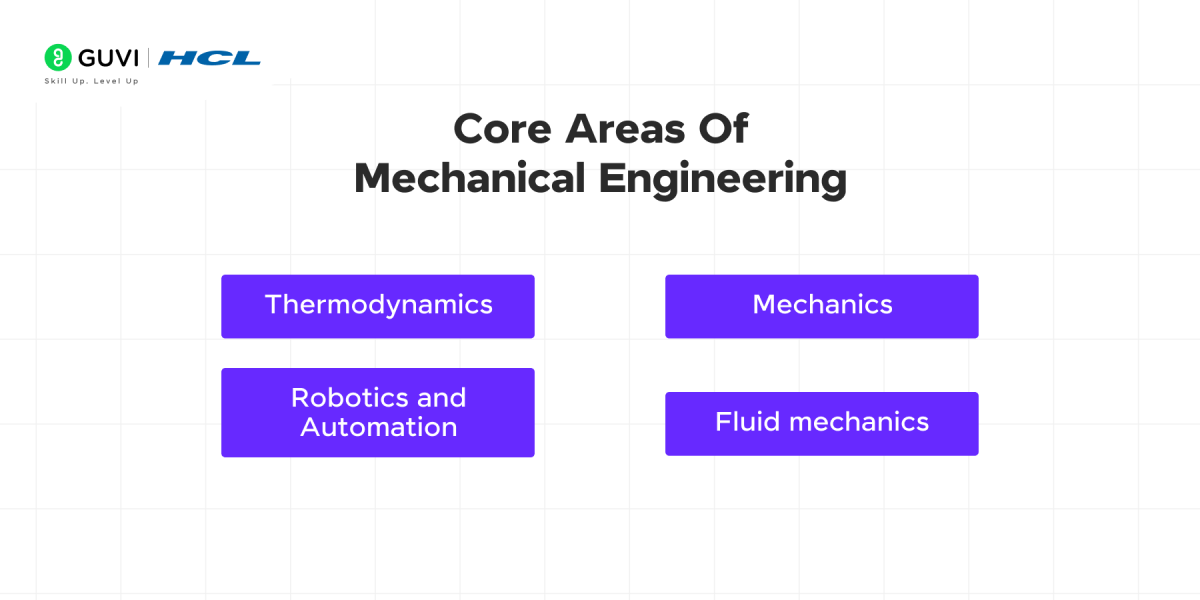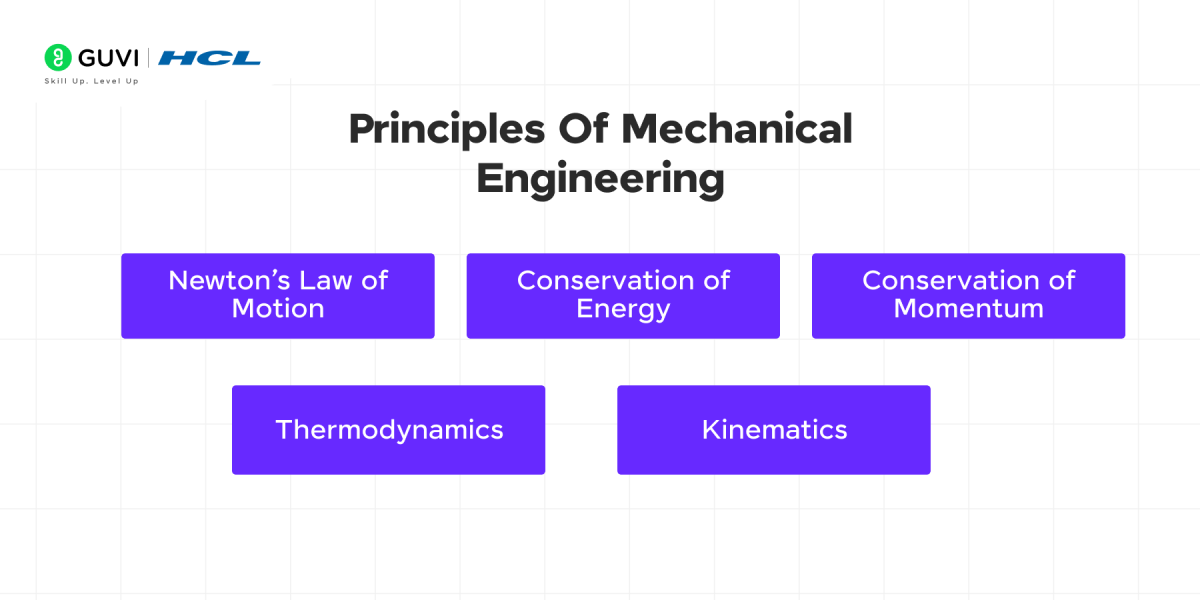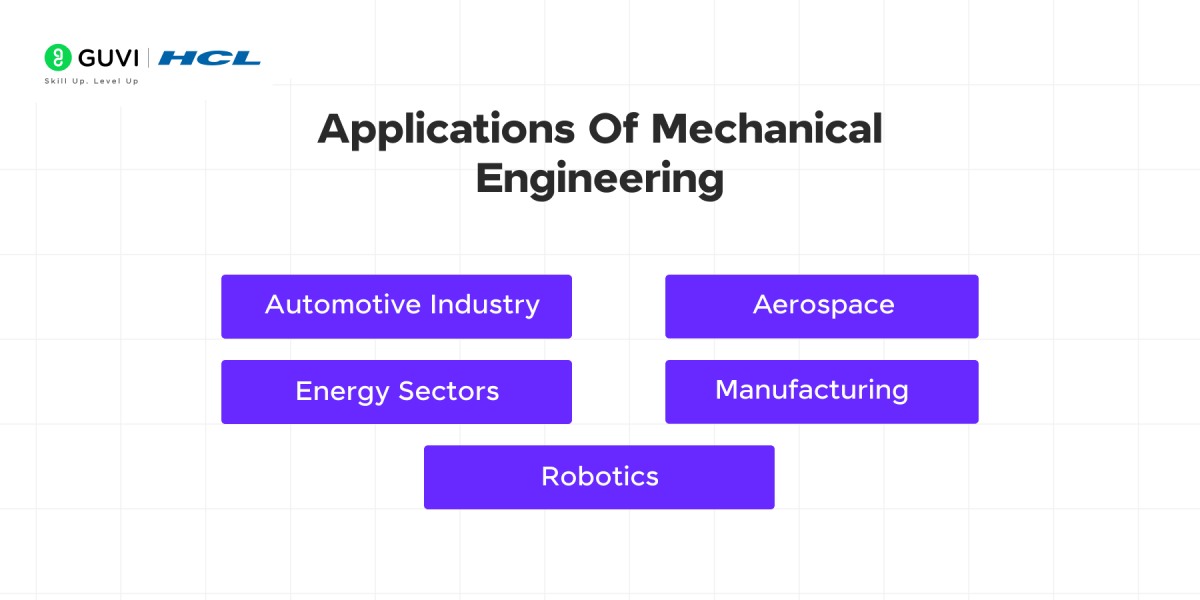
What is Mechanical Engineering 101: Introduction to Principles, Applications and Skills
Oct 10, 2025 5 Min Read 5983 Views
(Last Updated)
Mechanical Engineering is one of the oldest branches of engineering. It is the field that brings together the principles of physics, mathematics, thermodynamics, and material science to design, analyze, and manufacture machines and systems. From the vehicles to the tools we use, mechanical engineering plays an important role in shaping the technology in our daily lives.
In this blog, we will dive into the key aspects of mechanical engineering from its core areas to its fundamental principles, essential skills, and applications in real life. Whether you’re considering a career in mechanical engineering or curious about what it means, this guide will help you provide a solid understanding of this field.
Table of contents
- What is Mechanical Engineering?
- Core Areas of Mechanical Engineering
- Thermodynamics
- Mechanics
- Fluid mechanics
- Robotics and Automation
- Principles of Mechanical Engineering
- Newton’s Law of Motion
- Conservation of Energy
- Conservation of Momentum
- Thermodynamics
- Kinematics
- Skills Required
- Technical Skills
- Soft Skills
- Applications of Mechanical Engineering
- Conclusion
- FAQs
- Q1. Can I learn mechanical engineering online?
- Q2. Do I need a Master's degree to become a mechanical engineer?
- Q3. What is the salary range for a mechanical engineer?
- Q4. Are there certifications I can earn to advance in mechanical engineering?
- Q5. What are the most important skills for a mechanical engineer?
What is Mechanical Engineering?
From the name itself, we can say that mechanical engineering is the study of machines. It includes designing, analysing, and manufacturing machines according to the requirements. Mechanical engineering is a combination of physics, thermodynamics, mathematics, and material science to solve problems and create efficient, reliable, and cost-effective solutions in various industries such as automotive, aerospace, energy, and manufacturing. This field is vast and involves everything from creating household appliances to developing cutting-edge robotics and renewable energy technologies.
Core Areas of Mechanical Engineering

Mechanical engineering is a multidisciplinary field that spans various core areas of engineering. These areas encompass the theoretical, computational, and practical elements that mechanical engineers work with to design and optimize mechanical systems. Let’s look at some of the core areas of mechanical engineering.
Thermodynamics
The first core concept of mechanical engineering is thermodynamics. Thermodynamics is the study of energy, heat, and their transformations. Mechanical engineers use thermodynamics to design efficient engines, refrigerators, air conditioners, and other systems that involve heat transfer.
Mechanics
The next important core concept in mechanical engineering is mechanics. Mechanics deals with the behavior of solid bodies when they are subjected to forces. This involves studying forces, motions, stress, and strain in the materials. Statics (forces in equilibrium) and Dynamics (forces causing motion) are the two main subfields of mechanics.
Fluid mechanics
The next core concept is Fluid mechanics. While mechanics is the study of solid bodies, fluid mechanics is the study of how fluids (liquids and gases) behave under various forces. This plays a critical role in systems like HVAC, propulsion, and hydraulic systems. Mechanical engineers apply fluid mechanics to optimize designs that involve airflow, water flow, and fluid pumping systems.
Robotics and Automation
The last advanced core concept of mechanical engineering is robotics and automation. Robotics and automation focus on designing robots and automated systems that can perform tasks without human intervention. This can be used in manufacturing, medical devices, and even space exploration. Mechanical engineers work on designing robotic systems, integrating sensors and actuators for optimal system performance.
Now that we have seen the core areas of mechanical engineering, in the next section, we will look into the important principles in mechanical engineering.
Principles of Mechanical Engineering

Mechanical engineering is grounded on several fundamental principles that guide the analysis, design, construction, and operation of mechanical systems. Some of these fundamental principles include:
Newton’s Law of Motion
There is no mechanical engineering without Newton’s Laws. Newton’s laws are essential to understanding how forces affect the motion of objects. They form the basis for designing and analyzing systems such as vehicles and machines. Three laws of Newton’s are:
- First Law (Inertia): This law states that objects remain at rest or in motion unless acted upon by an external force.
- Second Law (F = ma): This law states that the force acting on an object is equal to its mass multiplied by its acceleration.
- Third Law (Action = Reaction): This law states that for every action, there is an equal and opposite reaction.
Conservation of Energy
The second most important principle of mechanical engineering is the conservation of energy. This principle states that energy can not be created or destroyed, only converted from one form to another. This principle is crucial in designing energy-efficient systems like power plants and electric vehicles.
For example, in an internal combustion engine, chemical energy from the fuel is converted into thermal energy, which is then converted into mechanical work.
Conservation of Momentum
The next principle is conservation of momentum. This principle states that the total momentum of a system remains constant unless an external force is applied. This principle is vital in analyzing collisions and the behavior of moving objects in mechanical systems.
For example, when two cars collide, the total momentum before and after the collision remains the same.
Thermodynamics
As we discussed earlier, thermodynamics governs the conversion of energy into work. The first law of thermodynamics deals with energy conservation, while the second law addresses the increase of entropy in isolated systems.
Kinematics
The last important principle of mechanical engineering is kinematics. Kinematics is the study of motion without considering the forces. This principle is essential for designing mechanisms such as gears, linkages, and robotic arms. This allows engineers to predict how a mechanical system will move in response to applied loads and forces.
Skills Required
Acquiring a wide variety of skills is mandatory in mechanical engineering. These skills are classified into technical skills and soft skills. Both are necessary for solving complex engineering problems, collaborating effectively, and advancing in your career. Below are the key skills you need to learn.
Technical Skills
Let us see some of the required technical skills for a mechanical engineer.
- Advanced Maths and Physics
Mathematics and physics are the fundamentals of mechanical engineering. You will gain knowledge on advanced concepts like calculus, differential equations, linear algebra, and physics to solve problems related to dynamics.
- CAD Software
Due to the advances in the computer science field, gaining CAD knowledge has become mandatory for every mechanical engineer. Computer-Aided Design(CAD) software is used to design, model, and simulate prototypes for a system. Tools such as SolidWorks, AutoCAD, and CATIA are used for designing.
- Manufacturing and Fabrication Techniques
The next skill is manufacturing and fabrication techniques. This is important because mechanics study different materials and fabrication processes used for the manufacturing of systems with different specifications and uses. This is a crucial skill that a mechanic should possess.
The common manufacturing methods are cutting, forming, 3D printing, CNC machining, welding, and casting to build a finished product according to a design specification.
- Control Systems and Automation
Learning control systems and automation tools is optional. But if you learn it, you can get a higher-level job. You can design and control systems using simulation tools like MATLAB or Simulink to develop automated systems, which are crucial in fields such as robotics and manufacturing.
- Thermodynamics
The last and most important skill is thermodynamics. It is a study of energy and heat transfer between systems. It will be great if you gain expertise in energy systems, heat transfer processes, and how to manage thermal systems in engines, HVAC systems, and energy-efficient designs.
Soft Skills
Soft skills are as important as technical skills. These skills act as an intermediate between technical and non-technical people. Similar to technical skills, it can also be studied and learned. Skills such as communication, problem-solving, and collaboration are essential for effective collaboration and project execution. These skills help mechanical engineers navigate challenges, work with cross teams, and ensure projects are completed on time and to the client’s expectations. In this section, we will see about these non-technical skills.
- Problem-solving: Mechanical engineering often requires finding innovative solutions to complex engineering challenges.
- Continuous Learning: The field of mechanical engineering is constantly evolving with new technologies, materials, and methods. You should embrace lifelong learning to stay updated with the latest trends, software tools, and industry advancements.
- Communication: They frequently collaborate with multidisciplinary teams and must be able to explain complex technical concepts to non-technical stakeholders.
- Time Management: Managing multiple projects or tasks simultaneously is common in web development. Good time management skills will help you meet deadlines and handle your workload effectively.
- Analytical Thinking: Strong analytical skills are crucial for solving problems, interpreting data, conducting tests, and optimizing the designs of an existing or new system.
If you are interested in learning more about CAD, you can enroll in HCL Guvi’s CAD Course on Design and Automation, curated especially for mechanical engineering students and professionals. It provides industry-recognized certifications, a one-month Internship with certification and hands-on experience.
Applications of Mechanical Engineering

Are you confused about the real-world application of mechanical engineering? Worry not! In this section, we will see some of the industries where mechanical engineers play a vital role.
- Automotive Industry: Mechanical engineers design vehicles, engines, and safety systems.
- Aerospace: Mechanical engineers create airplanes, spacecraft, and satellites.
- Energy Sectors: They develop power generation systems that include nuclear, solar, and wind energy.
- Manufacturing: They design machinery and automation systems for production lines.
- Robotics: Mechanical engineers design and develop robots for industrial and medical applications.
Conclusion
Mechanical Engineering is a broad and dynamic field that combines knowledge of mathematics, physics, and creativity to design systems that improve our daily lives. Whether it’s in the design of machines or the creation of advanced robotics, mechanical engineers have a critical role in shaping the future.
In this modern world of advanced technology, the role of mechanical engineers will only become more essential. If you’re passionate about solving real-world problems, pursuing a career in mechanical engineering might be the perfect fit for you. Happy Learning!
FAQs
Q1. Can I learn mechanical engineering online?
Yes, many online platforms offer courses in mechanical engineering, but they typically complement formal education. While you can learn specific skills and concepts online, a full degree in mechanical engineering usually requires in-person education for hands-on experience and practical training.
Q2. Do I need a Master’s degree to become a mechanical engineer?
No, a Bachelor’s degree in mechanical engineering is sufficient to start working as an engineer. However, a Master’s degree can open up opportunities for specialized roles, higher salaries, or academic positions.
Q3. What is the salary range for a mechanical engineer?
The salary for a mechanical engineer can vary based on experience, location, and industry, but on average, mechanical engineers can earn between ₹3L and ₹10L annually in India. Experienced engineers or those in specialized fields may earn higher salaries.
Q4. Are there certifications I can earn to advance in mechanical engineering?
Yes, certifications like Certified Manufacturing Engineer (CMfgE), Six Sigma, or certification in CAD software (e.g., SolidWorks, AutoCAD) can help mechanical engineers advance in their careers by demonstrating expertise in specialized areas.
Q5. What are the most important skills for a mechanical engineer?
Key skills include proficiency in mathematics and physics, problem-solving abilities, technical skills such as CAD (Computer-Aided Design), strong communication skills, and the ability to work in teams. Understanding materials science and thermodynamics is also crucial.
































Did you enjoy this article?